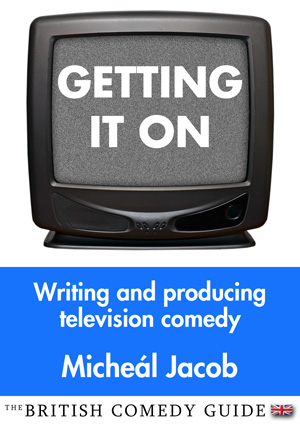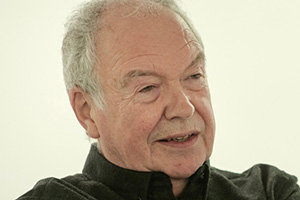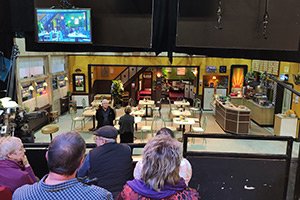Mapping a path through the sitcom jungle

Micheál Jacob is a former producer, executive, creative head and script editor in the BBC Comedy department. With a myriad of credits ranging from Goodnight Sweetheart to Two Pints, and My Family to The Smoking Room, he has just written his first book, 'Getting It On - Writing and producing television comedy'.
Sitting on a panel about sitcom writing at BCG's Big Comedy Conference, I realised that there are no new questions, and also no new answers. There is no shortage of guidance available, but it has to be the sort of guidance that works for you. Most things I've done in life have been self-taught because I've always had a difficulty with people teaching me, but occasionally there has been a teacher able to shed a helpful light on something, and my aim in writing this book was to think of the questions people have asked me over the years, and to cover the different areas in the ways which seem to have worked best. Hence the frequent illustrative anecdotes.
The following extract, about creating a sitcom, might seem to be stating the obvious, but if it helps aspiring writers to avoid the traps that are littered about the comedy jungle, then they can at least rest by the first watering hole before continuing their lonely journey towards a script commission and a series...
Sitcoms and sketches both involve characters in a story. A sketch is a short story, and a sitcom episode a longer one, but both demand to be structured. Despite all evidence to the contrary, many aspiring writers think it's enough to have characters - differentiated only by their names - telling jokes to one another, which is a fundamental mistake. Characters trading gags without a narrative context may start off entertaining, but rapidly becomes irritating.
A writer I worked with used to respond 'Trust me, it's funny' when I suggested that a page of gags unrelated to story was too much. That writer, who could have been a major name, took almost pathological care not to invest his characters with emotion, which I think explains why he isn't a major name; because characters need enough dimensions to feel real rather than just being vehicles for dialogue. Whatever the style of comedy, the people need to feel human, and relying on actors to bring people to life is never going to work. Actors can add, but they can't create without a foundation on which to build. A good show or sketch is one where you can imagine the people living a life between weekly appearances. A bad one is where the characters are flat enough to be stored in a wardrobe until their next outing. I recall a show where an actress gave a performance that was all over the place and drove everyone mad, but it was because she didn't understand who she was meant to be playing, and the writer was never able satisfactorily to explain.

The question of which comes first - character or situation - is really chicken or egg. David Brent was a character Ricky Gervais developed based on people he had met. Basil Fawlty was inspired by a real hotelier. Ben in My Family was based on Fred Barron's dentist father.
On the other hand, in the days when smoking rooms existed in offices, they brought together diverse people, linked only by their habit, allowing Brian Dooley a wide canvas on which to work. The inspiration for Goodnight Sweetheart came when Marks and Gran were renting an office, managed by a Mrs Deadman. What sort of situation would incorporate a deadman, they wondered? The Larry Sanders Show was inspired by the world of the late-night talk show host, and peopled accordingly.
So it's possible either to think of a world and decide who might be in it, or to think of a person and decide what sort of world he or she might inhabit.
What is vital is for the world, however stretched, both to have internal logic, and to feel real in its own terms. In 2001, two situation comedies were launched. One was The Office, the other was Office Gossip. In The Office, the workplace felt real. People actually worked. Office Gossip, an audience rather than a single camera show, was a very traditional sitcom where hardly any work was done, and where the situation was flimsily comic. In Are You Being Served? there were always enough customers to make it feel like a real store. Craggy Island feels entirely believable as a dumping ground for priests who have erred.
Hence, if the setting is a workplace it should feel like a workplace, if it's a Home Guard platoon, then it should reflect in a comic way the reality of the Home Guard, and if it's the offices of a late night talk show, it should feel authentic. The world of Toast Of London is entirely consistent, albeit very eccentric.
Just as aspiring writers confuse swapping jokes with creating characters, they are also prone to creating unconvincing worlds. A particular flaw is to think that if a setting or situation hasn't been seen before, then their show should use that setting. A wiser approach would to be wonder why, after many decades of comedy, no one has thought of it before? A moment's pause would suggest either that it has been tried and doesn't work, or that nobody wants it, probably because it has been tried and doesn't work.
The wildest idea I've had pitched to me was a show set in adjoining public lavatories, ladies and gents, which is not the most inviting world, particularly since there were some gruesome sound effects involved. Much more common are polar or jungle research stations, submarines, lighthouses, or small camps set up by the diverse survivors of a climate change disaster. One piece of conventional comedy wisdom is that characters are trapped, but being trapped emotionally or through circumstance is one thing, and being physically confined is another. Fletch was confined in Porridge, but there were quite a few places for him to function in and around the prison.
Whatever the world, it has to be one where an audience wants to spend time rather than making them want to escape.
This article is provided for free as part of BCG Pro.
Subscribe now for exclusive features, insight, learning materials, opportunities and other tools for the British comedy industry.



